Why Megabits Per Second Make A Difference for Remote Job Efficiency
Why Megabits Per Second Make A Difference for Remote Job Efficiency
Blog Article
Exactly How Megabits Per Second Influence Your Online Activities
The principle of megabits per second (Mbps) plays a pivotal role fit our on-line experiences. As electronic tasks multiply, recognizing the ramifications of Mbps on video clip, streaming, and gaming conferencing becomes increasingly important. Greater Mbps can enhance performance and lower disturbances, while inadequate rates might foster aggravation and ineffectiveness. Analyzing your house's details demands in regard to these rates is important, especially as several tools vie for transmission capacity. Yet, the nuances of just how Mbps influences various online tasks warrant additional exploration, especially as our reliance on digital connectivity proceeds to progress.
Comprehending Megabits Per Second
When considering web speed, it's necessary to recognize the concept of megabits per second (Mbps), which works as a basic measurement for data transfer prices. This statistics measures just how much information can be transferred over a net connection in one second, providing a clear understanding of efficiency capacities - Megabits Per Second. For context, one megabit amounts to one million little bits, and Mbps is commonly utilized to reveal data transfer for various on-line tasks
A greater Mbps indicates a faster internet connection, allowing users to do tasks such as downloading and install documents, surfing sites, and taking part in on the internet video gaming a lot more successfully. Regular browsing needs around 1-5 Mbps, while streaming high-def video clip might require 5-25 Mbps. Recognizing these requirements is important for identifying the appropriate net rate needed for details activities.
In addition, the variety of devices attached to a network can influence overall efficiency. Several users streaming, gaming, or downloading and install at the same time can stress offered transmission capacity, resulting in slower speeds - Megabits Per Second. Evaluating individual online habits and requirements is important in selecting an internet strategy that aligns with one's requirements, making certain a seamless digital experience
Streaming and Buffering Issues
Streaming high-definition web content has actually become a staple of modern online entertainment, yet it is often accompanied by discouraging buffering issues. These interruptions can considerably diminish the watching experience, bring about frustration and possible loss of target market engagement. Buffering happens when the information sent from the streaming solution is not gotten rapidly enough to preserve a smooth playback, often as a result of insufficient web speed determined in megabits per second (Mbps)

In addition, real-time streaming can be impacted by network congestion, which occurs when multiple gadgets share the very same bandwidth. Consequently, optimizing link speed and ensuring sufficient Mbps is important for a smooth streaming experience. As streaming solutions remain to evolve, comprehending the impact of Mbps on buffering problems continues to be important for consumers looking for uninterrupted entertainment.
Online Gaming Efficiency
The influence of net rate on on-line activities prolongs past streaming, significantly influencing online gaming performance. In competitive video gaming, reduced latency and high bandwidth are vital for a smooth experience. A fast connection reduces lag, enabling gamers to react quickly to in-game events, which can be the difference in between victory and defeat.
Transmission capacity, gauged in megabits per second (Mbps), plays a crucial duty in supporting multiple tools and pc gaming systems simultaneously. Not enough data transfer can result in went down links or reduced game high quality, negatively influencing gameplay. On-line multiplayer video games need significant data transfer, especially throughout peak pc gaming hours when many players are online.
Furthermore, the kind of game can also determine the needed web rate. Fast-paced first-person shooters require higher rates to preserve responsiveness, while turn-based technique video games may function moderately well on reduced speeds. As on-line gaming continues to progress, with increasing visual fidelity and even more complicated multiplayer environments, the demand for higher Mbps will only heighten. Subsequently, players need to guarantee they have ample web speed to boost their gaming efficiency and total experience. Purchasing a robust net connection is necessary for players aiming to optimize their performance and satisfaction.
Video Clip Conferencing Quality
In today's electronic landscape, video conferencing quality is greatly affected by internet rate, especially in terms of data transfer and latency. Premium video calls need enough bandwidth to transmit sound and video clip information effortlessly. Typically, a minimum of 1.5 Mbps upload and download speeds is advised for common meaning video clip, while high-definition video clip conferencing usually requires a minimum of 3 Mbps.
Latency, or the hold-up between sending and receiving information, likewise plays an essential function in the individual experience. Higher latency can lead to resemble, lag, and disjointed communications, which can hinder collaboration and involvement throughout conferences.
Furthermore, numerous individuals in a video clip conference can stress readily available data transfer, requiring even greater rates. Network congestion, often brought on by simultaneous activities like streaming or downloading, can additionally weaken video high quality. Hence, for companies depending on video clip conferencing for remote cooperation, understanding the partnership between megabits per second and total communication high quality is important for preserving productivity and boosting digital interactions.
Selecting the Right Internet Plan
Choosing an ideal web plan is important for making sure optimal performance in different on the internet tasks, especially in settings that demand high bandwidth, such as video conferencing and online gaming. Megabits Per Second. When thinking about an internet strategy, it is important to review both the speed and information allocation to match your specific use needs
For families with several customers taking part in synchronised activities, a plan supplying read this post here higher megabits per second (Mbps) is advised. Normally, a minimum of 25 Mbps is suitable for standard useful content streaming and surfing, while strategies going beyond 100 Mbps are better for more extensive tasks. In addition, consider the nature of your online activities; video clip conferencing needs at the very least 1.5 Mbps submit rate, while on the internet pc gaming may require a lower latency yet consistent connection.
It is likewise crucial to assess your information cap. Unrestricted data plans can avoid throttling and interruptions, especially if heavy use is anticipated. Lastly, study provider in your location, as accessibility and prices can differ. By attentively selecting a net plan customized to your requirements, you can improve your on the internet experience, making certain smooth, continuous access to your preferred tasks.
Verdict
To conclude, the importance of megabits per second (Mbps) in shaping on the internet tasks can not be overstated. Higher Mbps assists in seamless streaming, decreases buffering, boosts gaming experiences, and makes certain high-grade video clip conferencing. Conversely, insufficient bandwidth can result in aggravating interruptions and decreased efficiency throughout numerous jobs. Consequently, a detailed understanding of individual review or household Mbps demands is necessary for picking an ideal web plan that appropriately supports varied online tasks and individual demands.

Usually, a minimum of 25 Mbps is appropriate for typical streaming and browsing, while plans exceeding 100 Mbps are more suitable for more intensive jobs. In addition, take into consideration the nature of your online activities; video conferencing requires at the very least 1.5 Mbps publish speed, while on-line video gaming may need a lower latency yet regular connection.
Report this page